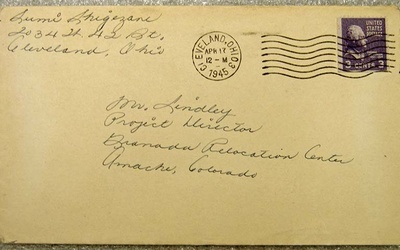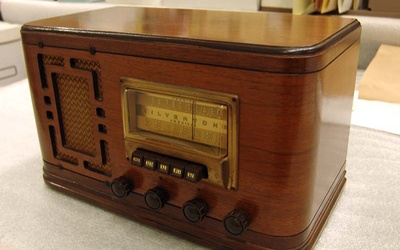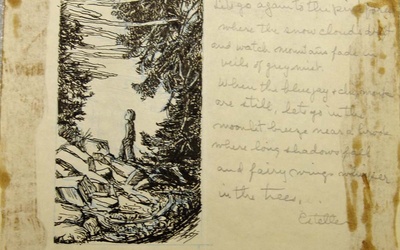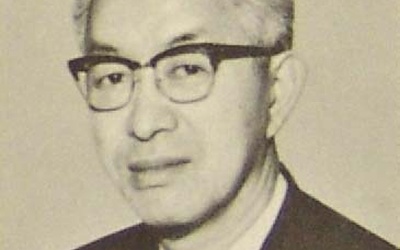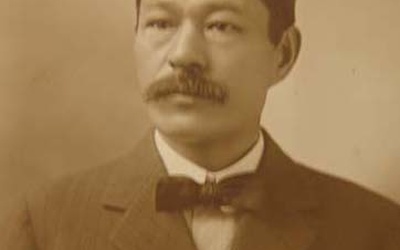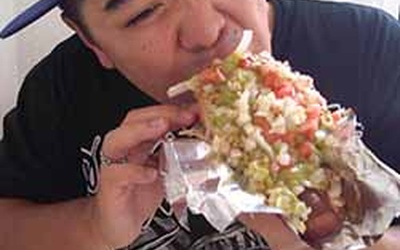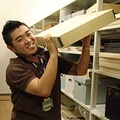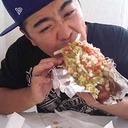
Dean Ryuta Adachi
@initial_deanDean Ryuta Adachi es mitad yonsei, mitad shin-nisei del norte de California. Actualmente es candidato a doctorado en Historia Estadounidense en Claremont Graduate University y profesor de Estudios Asiático-Americanos en Harvey Mudd College. Sus pasatiempos incluyen el snowboard, el judo, la lectura, ver deportes y ser voluntario en la comunidad japonesa americana.
Actualizado en octubre de 2011
Historias de Este Autor
Part 5 of 5 – History is Found: Sumi and Masao Shigezane
31 de mayo de 2012 • Dean Ryuta Adachi
Over the previous four installments of this series, I have attempted to demonstrate many of the ongoing issues here behind-the-scenes at the Japanese American National Museum. We are fortunate to have so many priceless artifacts that help tell the remarkable history of Japanese people in the United States, but for every Namyo Bessho citizenship record, there are countless Joyce MacWilliamson radios. Furthermore, even for all properly documented items we have, it truly is beyond our ability and capacity to go …
Part 4 of 5 – History is Lost: Joyce MacWilliamson
24 de mayo de 2012 • Dean Ryuta Adachi
To this point, we have examined three exceptional figures from the Japanese American community with remarkable stories and records. However, the sad truth is that for every item that we can properly describe, there are countless others that we can’t. In 1999, JANM received a curious donation offer from Ms. Joyce MacWilliamson of Beaverton, Oregon: Joyce MacWilliamson’s father Ramon “Mac” MacWilliamson took temporary ownership of a shortwave radio belonging to the 17 year old son of a Japanese American acquaintance. …
Part 3 of 5 – History is Ignored: Estelle Ishigo
17 de mayo de 2012 • Dean Ryuta Adachi
Estelle Ishigo is a name that may be familiar to many of you. She was one of the few whites to be incarcerated with Japanese Americans during World War II. Estelle voluntarily chose to enter Heart Mountain Relocation Center in order to stay with her Nisei husband, Arthur Ishigo. She authored the book Lone Heart Mountain (1972) and was the subject of Steven Okazaki’s Academy Award winning film Days of Waiting (1990). While Ishigo’s artwork is highly acclaimed in Japanese …
Part 2 of 5 – History is Told: S. John Nitta
10 de mayo de 2012 • Dean Ryuta Adachi
The second part of this series will tell the story of another fascinating individual with a tremendous contribution to Japanese American history. Shigeru “John” Nitta was born in Seattle in 1911, but moved to Japan as a child due to his father’s illness. He eventually returned to the United States (specifically Southern California), where he graduated from San Pedro High School in 1933. He soon moved back to Japan and studied chick sexing, which had recently been established and legitimized …
Part 1 of 5 – History is Made: Namyo Bessho
15 de diciembre de 2011 • Dean Ryuta Adachi
While not exclusively the case, we can simply surmise that fascinating individuals with fascinating life events make fascinating history. To appropriate Laurel Thatcher Ulrich’s famous phrase, well-behaved Japanese Americans seldom make history. From Fred Korematsu to Toyo Miyatake to Yuri Kochiyama, the Japanese Americans whose lives are memorialized in our exhibitions are primarily those who went against the grain and followed their beliefs. Although the vast heterogeneity and hybridity of Japanese Americans across three different centuries makes it difficult to …
Redefining “CAMP” In Japanese America - Part 3
14 de noviembre de 2011 • Dean Ryuta Adachi
Read Part 2 >>The Lasting Effects of the CampsThe camps are important not just because they are a week of enjoyment, but the impact from the week carries over for the rest of the campers lives. The newly formed friendships serve as the core to the legacy of the camp community. Since the camps are aligned with the Japanese American churches—which are the historic centers of the Japanese American community—the camps directly affect the next generation of Japanese Americans. It …
Redefining “CAMP” In Japanese America - Part 2
7 de noviembre de 2011 • Dean Ryuta Adachi
Read Part 1 >>United Methodist Asian American Summer CampIn 1974, Reverend Peter Chen of San Jose Japantown’s Wesley United Methodist Church and Reverend Harry Murakami of Livingston United Methodist Church created United Methodist Asian American Summer Camp (commonly referred to as Asian Camp) since the other summer camps of that era “did not meet their needs or speak to their unique experiences as ethnic minorities.” Chen also believed that “Asian-American youths could become a dynamic, powerful force within church once …
Redefining “CAMP” In Japanese America - Part 1
31 de octubre de 2011 • Dean Ryuta Adachi
On February 19, 1942, President Franklin D. Roosevelt signed Executive Order 9066 which led to the relocation of all 120,000 Japanese Americans living in the Western United States into internment camps. Today, historians consider this blemish in American civil rights to be the defining moment of the Japanese American community. Despite an overwhelming national distrust in their loyalty, Japanese Americans used the internment camps as a rallying point for unity and justice. This incarceration of Japanese Americans has led to …

